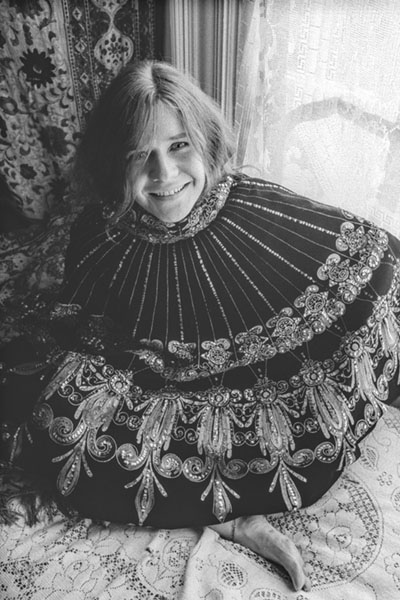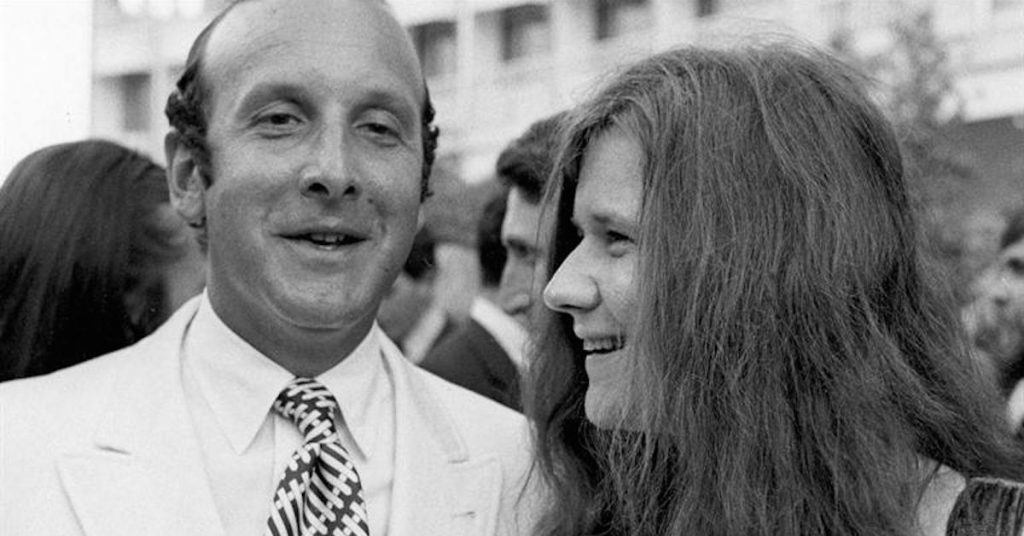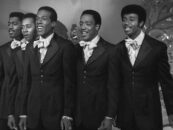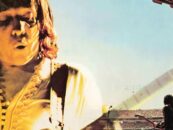Janis Joplin Remembered by Her Friends and Peers
by Harvey KubernikJanis Joplin was born on January 19, 1943, in Port Arthur, Tex., and would develop into one of rock music’s most iconic singers until her death on October 4, 1970.
In a series of interviews conducted over the past few decades, fellow musicians, friends, music business associates and others remembered the remarkable singer who made such a tremendous impact during her brief time in the spotlight.
Sam Andrew (Big Brother and the Holding Company): The Monterey Pop Festival was a watershed event for [the Joplin-fronted band] Big Brother and the Holding Company and, indeed, for the entire San Francisco counterculture. We had a clear idea about what was going to happen there, when we signed up for the festival.
Of course, the big story for us was the introduction of Janis to the big world, and that went well enough. People who had never heard/seen her understood suddenly what she was about. At Monterey, we heard a door opening into a whole new world. What had until that time seemed to be a very small scene of people trying to find a way to a new and more just life was now shown to be an international movement. Monterey was where literary San Francisco met hedonistic Los Angeles and both sides won.
Marty Balin (Jefferson Airplane/Starship): I had never heard anybody sing [George Gershwin’s] “Summertime” like Janis. She sent chills up my spine. I was standing on stage watching her do it. It was just amazing. I thought she was a great entertainer and just a fun person. People loved her.
Paul Kantner (Jefferson Airplane/Starship): Probably the reason that Janis died was that she got too popular and left her band. To her credit, [Airplane singer] Grace Slick didn’t leave the band and probably survived as a result. There’s a big difference between the two. Grace got, as you can imagine, all sorts of offers to go solo. On one level she didn’t feel confident enough. On another level, she didn’t want to leave the band the way it was.
Ravi Shankar: I had heard of Janis Joplin, but there was something so gutsy about her. Like some of those fantastic jazz ladies like Billie Holliday, that sort of feeling. So I was very impressed by her.
Watch Joplin perform at the Monterey Pop Festival
Henry Diltz (Photographer): Janis was just totally on fire and sang with every ounce of emotion she had. I’d never seen such intensity on a stage before.
Jim Yester (The Association): We stayed at the same motel as some of the bands, and right next door was Pearly [Joplin]. We met her. I was blown away. She was very down to earth, played with all the kids.
Watch Janis cover “Maybe,” a ’50s hit by the Chantels
Richie Furay (Buffalo Springfield): At Monterey, Otis Redding captivated the audience. Hendrix had charisma. Janis Joplin was a powerhouse at that show.
Clive Davis (former Columbia Records President): At Monterey, I was really just getting my feet wet in the business side of it. In June (1967), I came to the Monterey International Pop Festival not knowing what to expect, but seeing a revolution before my eyes. I was very aware that contemporary music was changing. When Janis took the stage, it was a totally unknown group to me, Big Brother and the Holding Company, and right from the outset it was something you could never forget.
She took the stage, dominated, and was absolutely breathtaking, hypnotic, compelling and soul-shaking. You saw someone who not only had the goods but was doing something that no one else was doing, with that fervor, that intensity, and impact,
Johnny Rivers: At Monterey, I saw Clive Davis jump out of his seat. I was standing in the wings of the stage, and after that, man, he was on Janis like a cheap suit.
Related: Joplin slays “Ball and Chain” at Monterey
Al Kooper: I saw Big Brother and the Holding Company at Monterey. I didn’t care for Big Brother but thought Janis was amazing, as a stage performer and a singer. Very unique. She played one night and she killed them so bad they put her on the next afternoon so she could be filmed by D.A. Pennebaker.”
Lou Adler (Co-producer of Monterey Pop Festival): The cameras were shut down for Janis. When she realized that she it wasn’t on film, she was devastated by it. She did another set for the camera later on and it was equally as great. Janis was fired up in the second performance because she now knew what impact she had on this audience. If Otis Redding got their souls and Ravi Shankar drove ’em out of their seats, Janis tore their hearts out and leading this all-male band.
Peter Lewis (Moby Grape): Janis Joplin couldn’t get arrested before Monterey. Her trip was, one day everyone is kicking your ass, and then the next day everyone is kissing it. It does something to you.

Janis Joplin, Big Brother and The Holding Company. Opening night of the Fillmore East, NYC, 1968. (Photo © Elliott Landy; used with permission)
D.A. Pennebaker: Big Brother and the Holding Company were the one thing we were told we couldn’t shoot for the film [Monterey Pop]. Albert Grossman [the band’s manager], said, “I’ll pull her the minute I see a camera going on her. All the cameras have to be pointed at the ground.” When I heard her, the first song, “Combination of the Two,” I said, “This is impossible.” So I went to Albert and I said, “Whatever it takes, we got to get her.”
Elliot Mazer (Producer/engineer): I recorded Janis Joplin. She was really interested in every aspect of making records. People keep referencing her sexuality. But in fact, she was an incredibly smart person that would really care about something and would work incredibly hard.
Pete Townshend: I couldn’t see how the Grateful Dead, Janis Joplin or Country Joe could be taken seriously. Their sound was so ragged, so raw. I was used to a slicker sound. Now I see better what they were doing. Just like the Who, it was not just about music, it was about message and lifestyle and change. The three bands I mentioned all had manifestos that were not just about the music. It took me a while to understand that.
Books about Joplin are available in the U.S. here and in the U.K. here.
Watch Joplin sing the Bee Gees’ song “To Love Somebody”
[Author and music journalist Harvey Kubernik’s books are available in the U.S. here and in the U.K. here.]








7 Comments so far
Jump into a conversationI will be honored to be the first! There has never been nor will there ever be another Janis. She was a power of her own making and took us all along for the ride. Thanks, Janis, for that beautiful, soulful, brilliant, hell-of-a-good-time ride! I know she’s still rocking and laughing that wonderful cackle of hers! It still makes me smile. RIP, Janis, Until We Meet Again!!!!
Aside from seconding what all her fans feel about how literally great she was as a singer, and even more as a performer, it’s been well documented that, beyond her public persona, Janis was a lonely soul. In that respect, I believe Paul Kantner’s comment about her was probably insightful, and probably accurate, as cold and clinical as it may sound. Show business is hard on the soul. We’ve seen countless times how it takes a toll on musicians and performers both on those who are successful as well as those pursuing that success. Not everyone can handle it, and perhaps more importantly, only a very specific kind of individual can handle it going alone. Janis’ environment and situation changed rapidly with her tumultuous success. Leaving Big Brother left her to have to carry the weight of that spotlight and success on her own, as opposed to the shining star in a group. That’s a big difference and a lot of pressure for someone who, reportedly, was a very fragile, and somewhat insecure person inside. Everyone did drugs in those days. But doing H alone in your hotel room says a lot about Janis’ life when she tragically died.
Amazing emotive performer! Even got a “WOW” from Mama Cass. Bless them both x
While I love Grace Slick’s work with the Airplane, there is no comparison between her and Janis Joplin. Janis was the driving force of Big Brother. Janis was an innovator and a singer like no one before her or since. I compliled the 50th Anniversary set of Cheap Thrills in 2018, which was released under the original title of Sex, Dope and Cheap Thrills, which included 2 hours of previously unissued Joplin vocals. She never sang a song the same way twice, so I chose multiple versions of the same sings released on the original album. Most of the tracks on the original Cheap Thrills was heavily edited by John Simon. Joplin’s singing improved with both of tbe bands she worked with after Big Brother. BBHC broke up because the band coasted while she soared. Joplin had a musical vision. If you listen to tbe band songs like Combination of the Two, Light Is Faster Than Sound, Blindman, etc. they are dated. Joplin’s singing is timeless. She was, in my opinion, the greatest female singer in rock and roll history and a great blues singer. The only female superstar in that music.
SCOTT-where can one [me!] be able to listen to YOUR compilation of 50 YEAR 2018 ANNIVERSARY SET of CHEAP THRILLS [aka SEX DOPE & CHEAP THRILLS…?] as mentioned above in your comment? Ido see a 30 song set on YouTube under that title, but do not think it is yours…? please advise, very interested 2 learn!
This should be it: ‘Sex, Dope & Cheap Thrills’ on Amazon
I read in past few yrs from book or record album notes of JANIS’ more obscure music album, that in her youth in high school she had like NO friends, was considered very odd, ugly, listened to music no one else was into, treated as outcast, and shunned and SUFFERED GREATLY! read this long after she and BBHC were famous…heartbreaking all that pain present in her life was carried so deeply plus loneliness of post show hotel room and overdosing on drugs too her away from us…CHEAP THRILLS was and IS such a great, rare collection of songs, still hopefully being discovered and cherished these days…